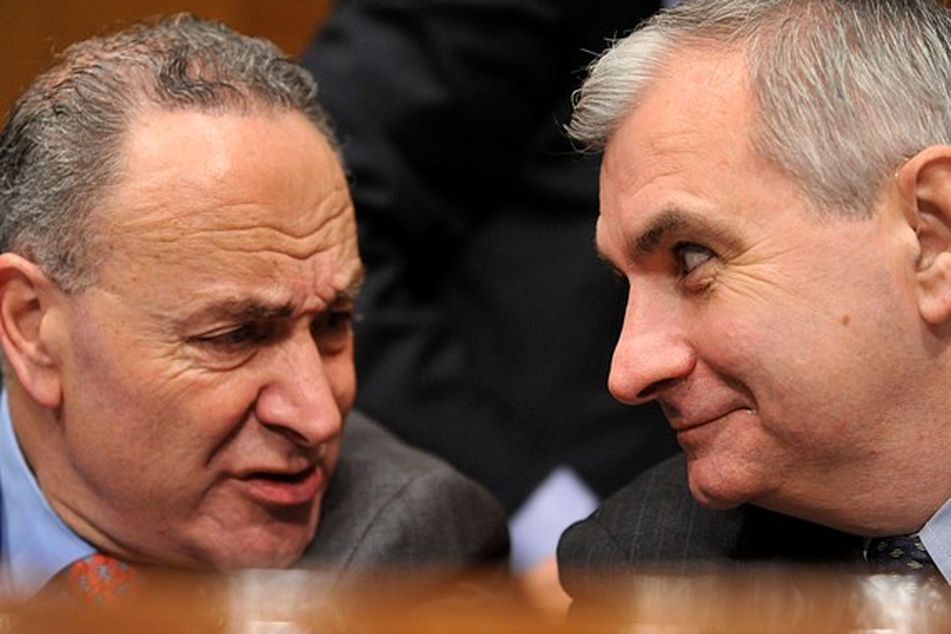Schumer wants early fight on ending Bush-era tax cuts for top earners

Several top Senate dems believe they're in a stronger position now than in 2010 to go after Bush-era tax cuts for top earners
Senate Democrats are considering a debate on ending the George W. Bush-era tax cuts for top earners before the November election because they think they’re in a stronger position than in 2010, Senator Charles Schumer said.
The tax cuts expire for all income brackets on Dec. 31. Schumer of New York, the third-ranking Senate Democrat and architect of his party’s communications strategy, says he doesn’t want to wait until the end of the year to debate Republicans over ending the break for high-earning taxpayers. The issue is part of the Democratic campaign theme of promoting tax fairness, he said.
The Senate’s majority Democrats may bring the issue to the floor for debate over the next few months to make their point.
“That is one of the things we’re looking at very carefully,” Schumer told reporters Feb. 28. “I think that the public is on our side.”
Senate Republicans, including John Thune of South Dakota, say Democrats risk overplaying the fairness issue. Thune, a member of the tax-writing Finance Committee, said Republicans will argue that a tax increase for some high earners would wind up raising taxes for small businesses. Many owners of small companies report their business income on individual tax returns.
‘Really Tough Place’
Democrats “are going to be in a really tough place in December” during a lame-duck session, Thune said in a Feb. 29 interview. “I still think that the message that we will carry, which is that you will be having a massive tax increase on small businesses, trumps” the Democrats’ inequality argument.
Democrats say they have gained the upper hand on the tax debate since 2010. The issue may bolster Democrats’ effort to gain control of the House in November, said Representative Steve Israel of New York, chairman of House Democrats’ campaign committee.
“The landscape has completely shifted,” Israel said in a March 1 interview. “Every time Republicans are defending tax cuts for millionaires and blocking tax cuts for the middle class, we win.”
Senator Sheldon Whitehouse, a Rhode Island Democrat, called the approach the “Jericho strategy,” akin to the biblical story of Joshua crumbling the city’s defenses by leading his army in marching seven circuits around its walls. Senate Democrats could use repeated votes and public pressure to sway Republicans, he said.
‘Can’t Take It’
“There’s a point at which they can’t take it any longer,” he said at a Feb. 29 event at the Center for American Progress, a Washington group often aligned with Democrats.
The emboldened Democratic stance is a shift from 2010. Democrats including Representative Gerry Connolly of Virginia and Senators Claire McCaskill of Missouri and Barbara Mikulski of Maryland said party leaders mishandled the issue then.
Democrats at the time had commanding majorities in the House and Senate. Some Democrats facing re-election in November 2010 worried that voters would reject them if they supported higher taxes for top earners. Democratic leaders decided to forgo votes on extending the tax cuts for all except the top brackets until after the election.
By then, Democrats had lost their House majority and narrowed their lead in the Senate. Facing the possibility that an impasse would lead to expiration of the tax breaks even for the middle class, President Barack Obama made a deal with Senate Republicans to extend the cuts for all income brackets through 2012. Obama has said he won’t make a similar deal again.
‘Should Have’
“It hurt us because we did not resolve this issue” before the 2010 election, Connolly said. “We should have and could have, but didn’t, and it gave a free issue to our opponents.”
Mikulski said Democrats can’t allow the same scenario to play out.
“We’ve got to put it in the sunshine” before the election, Mikulski said in a Feb. 28 interview.
Other Democrats are urging more caution. Senate Finance Committee Chairman Max Baucus, a Montana Democrat, said the strategy on the tax cut will “gradually take shape” on his panel before the end of the year.
“I’m going to have a lot of hearings of the Finance Committee on tax reform and that will be a good opportunity for senators to indicate their views,” he said in a Feb. 28 interview.
‘All Rhetoric’
Senator Robert Menendez, a New Jersey Democrat and a member of the Finance panel, said an effort to address the tax cuts before the election would be “all rhetoric and not a lot of substance.”
Representative Bill Pascrell, a New Jersey Democrat and member of the tax-writing Ways and Means Committee, said lawmakers should focus on renewing and extending miscellaneous tax breaks before turning to the Bush-era cuts.
“We have over 60 tax cuts that have expired,” he said in an interview. “It would seem to me that we should address those first.”
Senate Democrats are defending 23 seats in November compared with 10 for Republicans. Democrats in competitive races, such as McCaskill, said they would welcome the chance to vote on extending tax cuts only for the middle class.
“It’s a great idea,” she said in a March 1 interview. “It’s important that the people in my state know whose side I’m on.”
‘Not About Timing’
Another Senate Democrat in a competitive re-election campaign, Debbie Stabenow of Michigan, said she would support holding votes on extending the tax cuts for the middle class in the coming months.
“It’s not about timing,” Stabenow said in an interview. “It’s about getting something done.”
Congress first enacted the tax cuts in 2001 and 2003. Continuing them for all income levels would cost $4.5 trillion over 10 years in forgone revenue to the Treasury, according to the Obama administration’s 2013 budget proposal. Extending them only for individuals making less than $200,000 a year and married couples making less than $250,000 would cost $3.7 trillion over 10 years.
If Democratic leaders press for a debate and votes on the issue, they will have to decide what constitutes a high earner. The threshold in previous debates mostly centered on $200,000 for individuals and $250,000 for married couples.
$1 Million
Some Democrats suggest moving the line to $1 million to sharpen their argument that Republicans want to preserve tax breaks for millionaires.
“I’ve always felt $1 million is the right place to be,” Schumer said in a March 1 interview.
Obama hasn’t said whether he would support such a shift, though he helped form his party’s position by proposing the so- called Buffett Rule, named after billionaire investor Warren Buffett, who favors higher taxes for the richest Americans. The president said anyone who earns more than $1 million should pay at least 30 percent in taxes.
Republicans have opposed previous efforts to raise taxes for those with income exceeding $1 million. Given that hurdle, Senator Richard Durbin of Illinois, the chamber’s No. 2 Democrat, said Democrats shouldn’t surrender the $250,000 line.
“I’m in the $250,000 club, I always have been,” Durbin said. “Some push the million-dollar threshold to see if that extreme position would weigh on the conscience of some of our Republican friends, and apparently it is of no weight.”
–Bloomberg News–
Learn more about reprints and licensing for this article.







